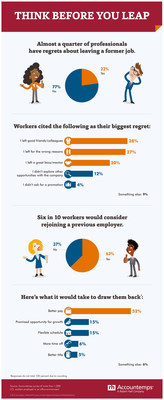Press Releases
Read about our latest research, including results from our ongoing surveys of senior managers and workers, and company announcements.
MENLO PARK, Calif., Aug. 9, 2017 /PRNewswire/ -- There are no regrets in life, they say, just lessons learned. But does that adage ring true when it comes to your career? In a recent survey from staffing firm Accountemps, 23 percent of workers polled said they have regrets about leaving their former job. Biggest regrets include leaving friends and colleagues (28 percent), departing for the wrong reasons (27 percent), and saying goodbye to a great boss or mentor (20 percent).

Sixty-three percent of workers would consider returning to a former employer, but it would take better pay (52 percent), promised opportunity for growth (15 percent) or a flexible schedule (15 percent) to entice them back, according to the survey.
View an infographic of the survey findings.
"Leaving one job and starting another is exciting, but it can also be a stressful decision," said Michael Steinitz, executive director for Accountemps. "If you're unhappy with your current role, carefully consider your options before you make a move you might regret later."
Professionals who carefully weigh their options before quitting a job are less likely to regret their decision, but they may still feel remorse. Steinitz added, "It's normal to be nostalgic about a former job, but you probably had a good reason to leave."
Do-overs are hard to come by in the corporate world. Accountemps offers a checklist of steps to take before and after deciding whether to leave your current employer:
If you're unsure about leaving
1. Address dissatisfaction. Try to resolve the issues that are making you consider a move. Request a meeting with your manager to discuss why you're unhappy, and try to come to a resolution.
2. Talk career path. Use the meeting with your manager to discuss potential growth opportunities within the company. If you do not feel challenged, ask for opportunities to work on bigger projects or ways to gain new skills.
3. Take a break. A heavy workload may be causing added stress, as you try to balance demands of the job and personal responsibilities. Use vacation time to relax and recharge – you may come back feeling satisfied and doubts may have disappeared.
4. Do your research. If salary is the primary reason for wanting to leave and your requests for a raise have gone unanswered, investigate what someone in your position with similar experience is making in your market. Resources like the Robert Half Salary Guides can shed light on starting salaries.
5. Network. Reach out to contacts in your industry to see what the employment market is like for someone with your skills and experience. If demand is low, be cautious about making a move. If demand is high, try to learn which companies are hiring, their corporate culture and other details that could help in your decision.
If it's time to move on
6. Exit gracefully. If you decide to accept another job offer, schedule a private, in-person meeting with your boss to discuss your decision to resign. Try to give at least two weeks' notice. Demonstrate respect and professionalism by offering to help with the transition during your final days.
7. Be wary of counteroffers. Now that you've quit, don't look back and renege on your agreement with your new employer by accepting a counteroffer. It not only burns bridges, but it likely won't resolve the original issues you had with your current job.
8. Give helpful feedback. If an exit interview isn't offered, request one. Be honest but tactful in your feedback. Your constructive criticism could help improve the workplace.
9. Stay in touch. Leaving good friends and mentors is one of the hardest aspects of changing jobs. Exchange personal contact information, add them to your professional online network and meet up occasionally to stay connected.
About the Research
The survey was developed by Accountemps and conducted by an independent research firm. It includes responses from more than 1,000 U.S. workers 18 years of age or older and employed in office environments.
About Accountemps
Accountemps, a Robert Half company, is the world's first and largest specialized staffing service for temporary accounting, finance and bookkeeping professionals. The staffing firm has 325 locations worldwide. More resources, including job search services and the company's blog, can be found at roberthalf.com/accountemps.
SOURCE Accountemps